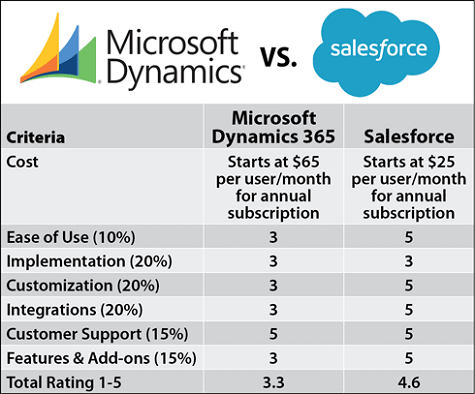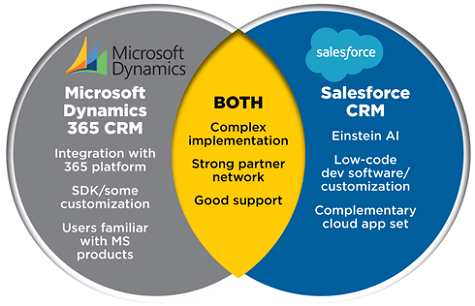Salesforce has spent the last 20 years building a $13 billion company, largely on the back of a CRM application delivered as a cloud service. In its most recent financial guidance, Salesforce forecasts it expects to achieve $16 billion in revenue next year, and within the next four years will be able to generate annual revenues in the range of $26 to $28 billion.
Given the overall expansion of the Salesforce offerings, it’s not clear how much of that growth will be specifically driven by CRM. But International Data Corp. (IDC) estimates that Salesforce has a 20 percent share of a CRM market that continues to be the fastest growing sector of the enterprise IT market.
In terms of capabilities, the Microsoft Dynamics 365 CRM software is very similar to the comparable Salesforce offering. But Microsoft got a much later start than Salesforce in the cloud. While Microsoft has gained CRM share of late, it’s worth noting that Salesforce’s three nearest rivals collectively still account for less than 20 percent of the overall market so Salesforce remains the best CRM software provider in terms of market size.
Microsoft, long term, may represent Salesforce’s most formidable rival. But the momentum Salesforce already has will ensure that it will be a dominant CRM force to be reckoned with well into the next decade.
What are the Similarities & Differences between Microsoft Dynamics 365 and Salesforce?

Cost
Salesforce Pricing
Small Business Essentials is $25/user/month (billed annually), Lightning Professional $75/user/month, and Lightning Enterprise $150/user/month.
Microsoft Dynamics 365 Pricing
The Customer Engagement Plan, a full CRM suite, is $115/user/month; the Unified Options Plan is $190/user/month; the Dynamics 365 Plan is $210/user/month.
Microsoft charges a higher monthly starting price. But cost comparisons are heavily dependent on the number of modules employed and by what types of users. It is possible, for example, to come up with an implementation of Microsoft Dynamics 365 CRM that costs less than a comparable instance of Salesforce. Each organization should carefully evaluate the total cost of either platform when all the features and capabilities they require are fully loaded.
Ease of Use
Both offerings address tasks such as contact and account management, territory management, and sales forecasting. But Salesforce has not only invested heavily in making sure its application consistently manifests on multiple endpoints. In addition, Salesforce has invested heavily in an Einstein platform that enables end users to take advantage of natural language processing and artificial intelligence (AI) technologies to interact with its applications. Microsoft is also committed to investing in similar AI technologies, but as AI applies to CRM, Salesforce is considerably ahead.
Implementation
Despite whatever promises are made, neither Microsoft nor Salesforce provides a true “out-of-the-box” application experience. Both applications should be implemented following a well-defined set of best practices ideally overseen by a certified consultant.
Customization
Microsoft makes it possible to customize some aspects of its CRM, while making available a software development kit to tackle more complex projects. Salesforce has made available a Lightning low-code development platform that can be employed by both power users and professional developers to customize its cloud applications to almost any degree imaginable.
Integrations
The Microsoft Dynamics 365 CRM offering fits well within the context of the larger Dynamics 365 platform, which provides connections to Microsoft Power BI and PowerApps. Microsoft Dynamics 365 CRM is also a more natural extension of Microsoft Office 365.
In contrast, Salesforce has invested heavily in making sure its CRM cloud offering integrates with a wide variety of applications and, following its recent acquisition of Mulesoft, will more tightly integrate its CRM offering with an integrated platform-as-a-service (iPaaS) environment.
Customer Support
Salesforce and Microsoft have both invested heavily in customer support. They have also both built extensive partner networks that provide customers with a wide range of support options.
Features & Add-ons
Both Microsoft and Salesforce make available a wide range of complementary applications via their respective app stores. But Salesforce has an extensive set of complementary cloud applications that address everything from marketing to customer service.
Related CRM Comparison Articles
How to Decide which is Best for Your Situation

Our Recommendation for Small and Medium Sized Companies (SMB)
While Salesforce clearly has some significant advantages in terms of capabilities, organizations will not easily be able to dismiss Microsoft. In many cases, the primary tool that smaller organizations rely on to manage contacts is Microsoft Outlook. Migrating to Microsoft Dynamics 365 CRM can seem like the next most logical transition.
Our Recommendation if Your Company Relies on Other Microsoft Products
Microsoft also provides a path for integrating its CRM software with the rest of the Microsoft Dynamics 365 ERP application. Finally, Microsoft also acquired LinkedIn, which provides a path to integrating its CRM with one of the most widely employed social media networks, relied on by business professionals.
The CRM that Most Sales Teams Prefer
Nevertheless, there are many more sales teams that know how to navigate Salesforce applications. Getting sales teams to want to use a CRM application in the first place is never an easy task. Getting them to embrace an application they don’t already know might be one challenge too many.










